大学实用英语听说教程 book1 u
新核心大学英语听说教程1uni

Before listening to the audio, try to predict the type of answer that will be given, such as a fact, opinion, or explanation. This can help you focus on relevant information and filter out irrelevant details.
• Enhance speaking skills: Students will practice speaking in different contexts, including making presentations, participating in discussions, and giving speeches.
模仿发音
通过模仿英语母语者的发音,提高自己的口语 流利度和准确性。
口语表达
通过回答问题、复述故事、描述图片等方式, 训练口语表达能力。
口语交流
与英语母语者进行口语交流,提高实际应用能力。
Role playing and group discussions
Positioning key information and filtering irrelevant information
Identifying important details
While listening, identify important details that are relevant to the question or task. This may include specific information, names, dates, or numbers.
全新版大学英语(第二版)听说教程第一册1-6文本

Unit 1 Studying EnglishPart BListening TasksScriptTalking About Studying EnglishAt a gathering of students from China and some other countries, Yang Weipingand Virginia Wang, both first-year college students, are talking about their learningof English.Hello, my name is Yang Weiping. I‟m a freshman at Beijing University and I‟m majoring in Chemistry.At college we have to study a foreign language. I chose English because I like listening to English programs on the radio and TV. I also like British and American pop songs. Some day I hope to visit Britain and the United States.I started learning English several years ago and I‟m getting better at it. My favorite activity is listening, especially listening to songs and stories. My big problem is, however, speaking. I feel nervous whenever I speak. And I never seem to know what to say when people talk to me. But I‟ve decided to overcome my shyness and learn to speak English by speaking as much as I can.Hi, my name is Virginia Wang. I'm a library science major at the National University of Singapore. In our country, English is important. It is one of the official languages and you have to be fluent in English to get a good job.I've been studying English since high school. I'm good at reading because I like learning about new things and new ideas. There are so many books and articles written in English. Our textbooks at the university are in English, too. I know writing is also very important, but I find it really difficult.When I graduate from the university, I would like a job in the city library where I can read all kinds of new books.Part CAdditional ListeningScriptHow to Improve Listening ComprehensionAmong the four skills of listening, speaking, reading and writing, I find listening most difficult, because I worry about the words I don‟t know. Now I‟m trying to focus on the general idea, not worrying about the new words. This makes me feel good, because I know I‟ve understood something. Then, I listen again carefully and if I have any problems I play the difficult parts again. In this way I come to understand better both the main idea and the details of the listening context.Unit 2 Fun with LanguagePart BScriptHow to Improve Your Conversation SkillsTo speak to people in a foreign language requires courage and a willingness to make errors. Some people are so afraid of making mistakes that they never open their mouths. And that‟s the biggest mistakes of all. Now if you have courage and are ready to make a few errors, what do you say?First of all, you have to open the conversation. Finding an appropriate topic is half the battle. Some topics, such as the weather and news, work well. But others, such as age, money or people‟s appearance do not. The following are some good ways to open a conversation.Weather—It sure is cold today, isn‟t it?News—-Did you hear about that terrible forest fire?A conversation in a foreign language doesn‟t always go smoothly. Sometimes yo ur partner talks too fast and you find it difficult to follow. Not to worry, though. You can always ask your partner to repeat what he has said or to speak more slowly. For example, “Excuse me, but could you say that again? I didn‟t catch it.” Or “Could you speak more slowly, please?”At the end of a conversation you need to find a way to close it in a polite way. “Well, I really need to be going” or “It was nice talking to you” are frequently used by people to end a conversation.Part C Additional ListeningScriptSmile When You Read ThisHow good is your memory? Answer these four questions: What did you have for breakfast yesterday? What clothes did you wear last Friday? Who did you talk to yesterday? Where did you go last Saturday? If you can answer all the four questions, your memory is very good.Education specialists in England have been looking into ways to improve our memory of what we read. The specialists found something to help: facial expressions. They gave ten students a happy article to read. Five of the students read the happy article while smiling. Five students read the happy article while frowning. Then they answered comprehension questions. The smiling students remembered more of the happy article than the frowning students.Then the specialists gave ten students another article to read. It was an angry letter to the editor of a newspaper. Five students read the angry article while smiling, and five students read the angry article while frowning. Which group remembered better? You‟re rig ht. The frowning students.The specialists don‟t know why facial expressions help memory. They are continuing to study the relationship between the mind and the body. Until they find the answer, keep smiling (or frowning?)!Part DScript:Many expressions may be used to describe someone who is excited. One such expression is to be "beside oneself". You can be beside yourself with anger or beside yourself with happiness, although usually not both at the same time! If you are beside yourself, you are filled with excitement.The dictionary tells us that "beside" means "next to", or "at the side of". So the expression"beside oneself" describes something that really is not possible.Today, you might hear a husband say, "When my wife told me we were going to have a baby, I was beside myself with joy." Or someone might tell you he was beside himself with anger because he had just lost his job.When you are full of joy or are extremely excited about something, you may do something else that is strange. You may "flip your lid". A lid is the cover that prevents something from escaping from a container. A lid on a cooking pot, for example, keeps the heat from escaping. To flip something is to turn it over. So when you "flip your lid", you become so excited that you lose your self-control.Unit 3 School LifePart BScriptAccommodation for College StudentsR:Good morning. Can I help you?S: Yes, please. I'm a new student and I'd like to have some information about the ...em...the accommodation for students.R: Right. The university provides two types of accommodation, halls of residence and self-catering accommodation.S: How much does it cost for the self-catering accommodation?R: For a single room, £37.86 per week, that's about £5.40 a day. For a double room, it's £52.78 per week. This will apply throughout this academic year.S: I'd like to stay in the self-catering accommodation. How far is it from the residence to the university?R: It all depends. The residences at Elms Road and Palm Road are about one and a half miles from the university main site and the Freemen's Common Houses at William Road are half a mile.S: When do I need to apply?R: Are you an undergraduate or a postgraduate?S: Undergraduate.R: Then you should apply for it as soon as possible, since places in university-owned accommodation are limited and if you don't apply before the end of the month, you are not likely to get a place.S: Could you possibly tell me what to do, if no vacancy is available?R: Yes, you may consider private accommodation. The university runs an Accommodation Information Office and its staff will help you.S: Where‟s the office?R: In the Students‟ Union Building.S: Whom can I contact?R: Mr. Underwood. David Underwood, the manager of the accommodation information office. S: Thank you very much.R: You are welcomePart CScriptWhat College Professors DoCollege professors are often believed to lead easy lives of quiet thinking while teaching one or two classes every week. But college professors do much more than go to class. The average professor spends between six and fifteen hours in the classroom weekly. And that same college professor works from sixty to eighty hours a week.Because they must remain current in their fields, professors spend part of that time reading, reading, reading. That leads to additional hours during which they revise and update their class lecture notes. It takes far longer to prepare notes than to deliver them in class. Professors may spend time conducting experiments, working on college projects, or advising students. They may be writing books, articles, or papers for delivery at conventions.When not in the classroom or in the office, professors are still working, behind closed doors in committee sessions or at home grading papers and preparing for tomorrow‟s class es. To accept this sort of schedule willingly, they must feel strongly about the importance of the college experience.Part DScriptDespite what your parents and others try to make you believe, life at college may not be the best experience you will ever live through. Why?The simple one word answer is: Roommates. One has often heard about the guy that never sleeps or the girl who always has her friends over or the one who studies all the time and becomes very disturbed by the slightest movement you make. Okay, they are not all that bad. So how do you get them to stop?You can't do it. It's impossible. The only way you will be able to live with your roommates is by compromising. If you like to have friends over, but your roommates want to study, take your friends out. If you don't like to listen to music while you are studying but one of your roommates does, ask him to use headphones. Talk about your habits and ask your roommates about theirs. Respect your roommates and your roommates will respect you.You may not be friends with your roommates by the end of the year but you may be friends with them the year after, when you are no longer rooming together. This is alright though. Sometimes it's too difficult to try to live together and be good friends at the same time. Roommates are not always meant to be your best friends.Remember: Not only do you have roommates, you are a roommate. Be good to your roommates.Unit 4 Going to a PartyPart BScriptSmall Talk Is EasyA: Mike, guess what?B: What?A: Carol just invited me to a party at her house on Saturday.B: Carol? You mean the pretty girl in your economics class?A: Yeah.B: Great! I‟m sure you‟ll have a super time.A: I‟m not so sur e.B: What do you mean, John? I thought you really liked Carol.A: I do. But I don‟t know her friends very well.B: So get to know them.A: But I‟m no good at small talk.B: Small talk is easy. You can learn.A: By Friday?B: Sure. I‟ll coach you. You just have to remember a few simple sentences.A: I don‟t know. I have trouble remembering things. Especially when I meet people. I get nervous. B: Don‟t worry, John. You can do it. You just need a few tips.A: But what if I say something stupid?B: Relax. You won‟t. But even if you do, it‟s all right. Everyone makes mistakes.A: Yeah, especially me! What if I‟m boring? No one wants to listen to a bore.B: Hey, you're not giving a speech. You're just having a conversation. So just talk about something you know they are interested in.A: That's the problem. I don't know what Carol's friends are interested in.B: Let them tell you. If you let people talk about themselves, they'll think you're interesting.A: You mean something like, "So, tell me what you're interested in."B: Well, you don't have to be that direct. For example, you can talk about the weather.A: You can't be serious. The weather's boring.B: It's a good excuse to find out what they like to do. On a rainy day, you say, "What do you do in such terrible weather?"A: What if they just stayed home and read a book?B: Then ask them about the book. You can ask if it was good. Ask if they liked it and why. Then talk about a book you really liked.A: So that‟s what small talk is about, is it? Well, I‟ll give it a try. Thanks for the tips, Mike.B: You‟re welcome. Have a good time at the party.Part CScriptAre You Calling About the Party?Laura: Hello. This is Laura David speaking.Simon: Oh, hello, Laura. This is Simon here, Simon Williams.Laura: Oh, Simon. How nice to hear from you. Are you calling about the party? You did get the invitation, didn‟t you?Simon: Yes, thanks, I did. That‟s just it, I‟m afraid. You see, I‟m already tied up that evening. Laura: Oh, reall y? That‟s a pity.Simon: Yes. I‟m afraid it‟s been planned for ages. You see, some friends of mine are coming from Scotland to see me. I haven‟t seen them for a long time, and you know … well …I managed to get some tickets for the opera, and I promised to take them out to dinnerafterwards. I can‟t get out of it, unfortunately. I wish I could.Laura: Oh, what a shame! We were looking forward to seeing you. Still, if you drop in later with your friends, we‟d love to see you.Simon: Thanks. Well, I‟ll certainly try, but I don‟t think there‟s much chance. Actually I‟ve sent you an e-mail to say that I can‟t come.Laura: Oh, have you? That‟s very kind, thanks. Well, keep in touch, Simon.Simon: I will. Regards to James. And I hope the party goes well. Bye!Laura: Thanks. Bye.Unit 5 TelephoningPart BScriptA Business CallA: Good afternoon. ABC Imports. May I help you?B: Yes, may I speak to Mr. James Johnson, please?A: I'm afraid Mr. Johnson isn't available right now. Would you like to leave a message?B: This is Richard Alexander with Star Electronics. It's very important that he returns my call this afternoon.A: Does he have your office number and your mobile phone number?B: I think so, but let me give them to you again.A: Okay.B: My office number is 714-555-2000; my cell phone number is 909-555-2308. He can reach me at my office number before 6 p.m. or anytime today on my mobile.A: Very well, I'll give him your message as soon as he returns to the office.Part C Additional ListeningScriptGood Luck CompanySecretary: Good Luck Company.Applicant: I‟m calling in connection with your post of computer sales representative. Your advertisement said that I should ring up first for an interview.Secretary: That‟s right. What are your qualifications?Applicant: I have a degree in Computer Science.Secretary: Do you have any relevant work experience?Applicant: Yes, I have been a computer programmer in a trading company for three years. Secretary: Can I have your name, please?Applicant: Brian TongSecretary: Okay, I‟ve written down your information and I‟ll pass this on to our personnel department for further consideration before we decide whether there will be aninterview with you.Applicant: When would you let me know the result?Secretary: In about two weeks‟ time, I think. How can I contact you, Mr Tong?Applicant: You can call me at my office at 3883-9673 during office hours.Secretary: 3-8-8-3-9-6-7-3. Okay, I‟ll let you know the result whe n I hear from the personnel department.Applicant: Thank you. Good-bye.Secretary: Good-bye.Part DScriptM: Hello. This is Simon speaking. Is that you, Judy?W: Oh, hello, Simon. Judy here.M: Judy, I‟ve got your mail. But are you sure that you can‟t come to the party?W: Yes, I‟m sure.M: What a pity!W: I‟m sorry too, but you know how it is.M: You‟ve got work to do, have you?W: I‟m afraid so. It‟s to do with work.M: Well, you know the saying, …All work and no play makes Jack a dull boy.‟W: Yes, I know, I know, but I‟ve got to mark all the examination papers and it‟s our school‟s parents‟ meeting on the same night as your party. I have to meet my students‟ parentsand talk to them about their kids. And—you know—all the teachers have to be there. SoI‟ve got to go, I‟m afraid.M: Yes, yes. I see. It‟s a late meeting, isn‟t it?W: Well, it starts at seven-fifteen and usually goes on until about 10.M: Oh, well, if the meeting ends early, come along.W: I will. Thanks, Simon. Bye!M: Bye!Unit 6 ShoppingPart BScriptWhere Can We Find Women's Wear?Mark: Excuse me, where can we find women's wear?Receptionist: On the second floor. You can take the escalator on your right.Mark: Thank you.Salesperson: Good morning. Can I help you?Ann: No, thanks. We're just looking.Mark: How about this red dress, Ann? It's very fashionable.Ann: I don't know. I'm not crazy about red. I think it's a bit too bright for me. Salesperson: How about this white dress? It's a new arrival for the season.Ann: Is it? It looks pretty. But is it very expensive?Mark: Let me see the price tag. It says $299.Ann: That's too expensive for me. I'd like something below $200.Salesperson: What about this blue dress? It's on sale. It's 10% off, so it's only $126.Ann: Mmm. I like the color. Do you think it'll look good on me, Mark?Mark: I think so. Why don't you try it on?Salesperson: What size do you take?Ann: Medium.Salesperson: Here's a medium in blue. The fitting room is right behind you.Ann: (wearing the dress) What do you think of it, Mark?Mark: It's very nice. I think blue suits you. And it fits perfectly.Ann: Great. I think I'll take it.Mark: That's a good deal.Salesperson: Will that be cash or charge?Ann: Cash, please.Part CScriptDefective GoodsThe other day, Mrs. White bought some bed linen at a small store near her home The store had a good reputation, and Mrs. White had often shopped there before. But when she got home and examined the sheets, Mrs. White was shocked. One of them had a big hole in the middle, and another was badly stained. And two others were frayed at the edges.As you can imagine, Mrs. White was very angry and she went back immediately to complain. When she arrived the store was closed and two other angry ladies were waiting outside. One of them told Mrs. White that she had bought some towels that morning, and the other lady said that she had purchased a linen tablecloth. In both cases the goods are defective. A little later some other women joined them, and they all told the same story.Finally the shopkeeper appeared and let them in. The poor man looked very worried. He became very nervous when the ladies threatened to call the police, but he denied trying to cheat them. Then he explained what had happened. In his absence, the driver of a delivery truck had mistaken his shop for a secondhand goods store and had delivered a load of used material from a nearby hotel. The sales clerk had not bothered to check the delivery and started selling the defective goods right away.The shopkeeper apologized for the mistake and promised to exchange the ladies‟ purchases and to refund half the price. Needless to say he fired the careless assistant.。
全新版大学英语听说教程Book 1 Unit 3PPT课件

❖ 3. Check the answers and note difficult points . ❖ 4.Replay the difficult points and explain. ❖ 5. Play the tape a third time and let the students
4
Listening Strategy
Purpose: To help the students to identify consonant clusters.
5
Teaching steps
❖ 1. introduce what is consonant cluster, comparing with consonants /ts/, /dz/, /tr/, /dr/.
❖
Warming-Up Exercise
❖
Communicative Function
❖
Listening Strategy
❖
● Period 2
❖
Part B School Life
❖
Pre-listening Task
❖
Listening Tasks
❖
Speaking Tasks
IV.
Home Listening
❖ 2.introduce information of western accommodation to the students and help them make coions
21世纪大学实用英语第一册unit1PPT
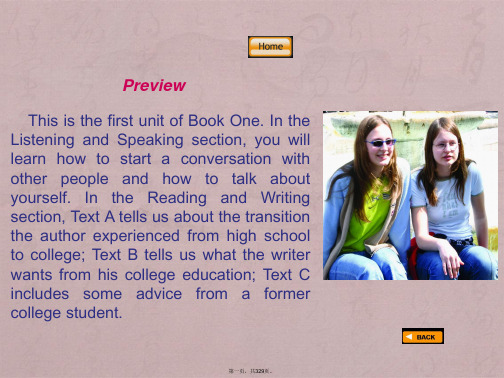
第十页,共329页。
PREV.
NEXT
Time
Contents
Plan
complete English sentences or just phrases. If the students have difficulty doing this, the teacher should provide them with the following key words in English: beautiful campus, good library, teachers and classmates, the computer
people when meeting them for the first time; 2. understand the main ideas of Texts A, B and C, and master the
useful sentence structures and words and expressions found in the relevant exercises of the first two texts; 3. know clearly how to use the present simple and past simple tenses of English; 4. fill in a form with their personal information; 5. understand the main idea of an English paragraph and identify the topic sentence.
第十三页,共329页。
PREV.
NEXT
Time
Contents
大学第一册英语听力

Part I Getting ready (5)
Book 1-Unit 01-Part 1
C Listen to the telephone number and choose the answer.
全新版大学英语听说教程Book 1Unit 5

Listening Tasks
• Purpose: Train the students’ ability to understand the general idea of
the listening text and important details.
• Teaching Steps:
Let the students learn the new words on Page 45.
Communicative Function:
Taking Telephone Messages
• Purpose: Teach the students how to take telephone messages • Teaching Steps:
Introduce some useful expressions for leaving or taking telephone messages. Tell the students pay more attention to “to whom”,”when””where””what”,etc when taking telephone messages. Play the tape once for the students to complete the exercise. Make some explanation on difficult points. Replay the tape for students to check the answers.
II. III.
Procedures :
Period 1
Part A: Telephoning
Warm-up Activities Communicative Function Listening Strategy
大学英语视听说教程1

大学英语视听说教程1大学英语视听说教程1中的重点内容1. 名词性从句 (Noun Clauses)在句子中起名词作用的从句被称为名词性从句。
名词性从句可以充当主语、宾语、表语或同位语。
例句: What he said made me angry. (宾语从句)2. 介词短语 (Prepositional Phrases)介词短语由介词及其宾语组成,在句子中作为修饰语、状语或补语使用。
它们可以描述地点、方向、时间、原因等。
例句: She walked across the bridge. (地点介词短语)3. 动词的时态和语态 (Verb Tenses and Voice)动词的时态表示动作发生的时间,包括一般现在时、过去时、将来时等。
语态表示动作的主体与承受者的关系,包括主动语态和被动语态。
例句: He will study abroad next year. (一般将来时)4. 名词的所有格 (Possessive Nouns)名词的所有格表示所属关系,通常在名词后面加上's或'来表示所有物。
例句: This is John's car. (名词所有格)5. 虚拟语气 (Subjunctive Mood)虚拟语气用于表示与事实相反的假设、愿望或建议。
常见的虚拟语气形式包括过去式、"would" + 动词原形等。
例句: If I were you, I would study harder. (虚拟语气)以上是《大学英语视听说教程1》中的一些重点内容,通过学习这些知识点,可以提高英语的听说能力。
新实用英语视听说教程第1册最新版教学课件内置音视频U1 (上)
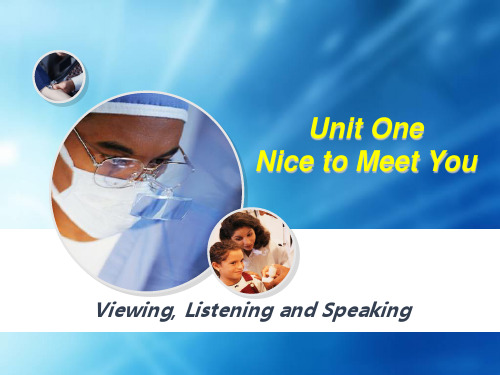
C. She’s a salesperson. 2. Why doesn’t Lynn like her job?
A. The money isn’t good. B. She doesn’t like her boss.
✓C. She works long hours.
✓ A. France B. Canada C. The United States
4. Marie teaches .
✓ A. French B. business management C. English
5. Rick and Sachiko are studying .
✓ A. Mathematics B. English C. business management
to know? Paula: Of course ______ Ido.
Episode 2
Task 2 Watch the episode again and choose the best answer to each question.
1. What does Lynn do? A. She’s a hotel worker.
3. What does Lynn want to do?
✓ A. Work in a hotel.
B. Work for an airline. C. Work in a resta 3 Watch the episode again and decide whether the following statements are True or False.
Episode 3
So that opens up the doors of conversation. While you are at the dinner party you have a responsibility to several guests. That is going to include the person directly in front of you and the person to your right and the person to your left. If it’s a small table of six then you could actually interact with everyone. A very large banquet table then you had better only being responsible to interacting with the person across from you and the person on either side of you. Your responsibility is to add value to the meal with interesting and inter-lectural conversation. So, when I am looking at this person I want to be very interested in indicating that with my body and language. I am going to nod at them and say “fascinating and tell me more”. When I was in Italy last year, I experienced something similar. How did you end up handling that situation? Now I am speaking to this person. However, we have other guests as well. So I might catch up someone else’s eyes and say they are very interested. And then I say “John I see that you like to add some comments to the Italy experience”. Then that would include them as well. So, it’s looking, nodding of the head. “Fascinating. Tell me more.”
大学实用英语听说教程Book1Unit2
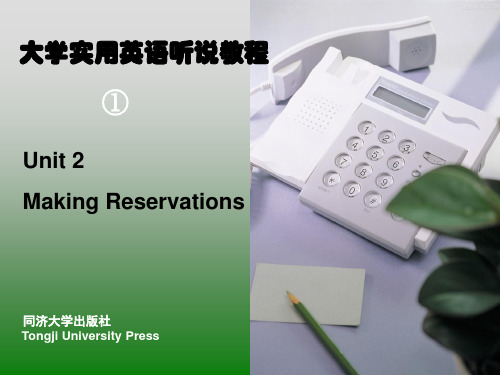
2.
Hello! What can I do for you? I want two tickets for Cinderella for the evening of the 7th. We have different prices for different seats . Which would you like? What do you have? The prices range from 500 Yuan, 200 Yuan, 100 Yuan to 50 Yuan. Two 100 Yuan tickets, please . Your name, address, and phone number, please . My name is Martin, and I am staying in Room 830 at Peace Hotel. My phone number is 65330000. Clerk: Thank you. Your tickets will be delivered to you around four o'clock this afternoon. Martin: Thank you so much.
B C
B
Home
Conversation 1
I’d Like to Book a Room in your Hotel
Exercise 2: Listening for Details
1. The hotel in which Denial would stay has many kinds of rooms, such as single rooms, double rooms and suites and so on. 2. Denial would like to have a room with twin beds . 3. Denial was lucky because the hotel offered a 15 percent discount for him. 4. When Denial is in Beijing, the days will be sunny , and the wind gentle . 5. From the conversation, we know that Denial is a British .
新实用英语视听说教程第一册第二版
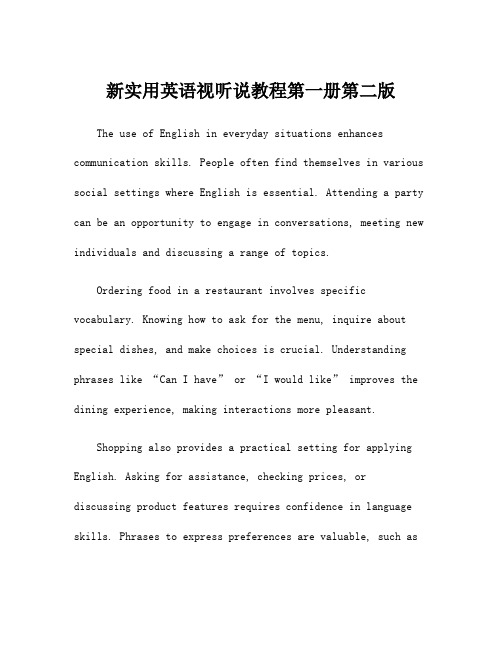
新实用英语视听说教程第一册第二版The use of English in everyday situations enhances communication skills. People often find themselves in various social settings where English is essential. Attending a party can be an opportunity to engage in conversations, meeting new individuals and discussing a range of topics.Ordering food in a restaurant involves specific vocabulary. Knowing how to ask for the menu, inquire about special dishes, and make choices is crucial. Understanding phrases like “Can I have” or “I would like” improves the dining experience, making interactions more pleasant.Shopping also provides a practical setting for applying English. Asking for assistance, checking prices, or discussing product features requires confidence in language skills. Phrases to express preferences are valuable, such as“Do you have this in another size?” or “Can you recommend something?”Traveling opens up new avenues for language use. Navigating airports, booking accommodations, and asking for directions are common activities. Mastery of travel-related vocabulary, including transportation methods and common landmarks, can make trips more enjoyable.In academic settings, participating in discussions or group projects helps build fluency. Expressing opinions, listening to others, and providing feedback are important skills. Engaging actively in classes promotes a deeper understanding of both language and subject matter.Workplace communication is also significant. Understanding job-related terminology and being able to articulate thoughts clearly are necessary for effective collaboration. Writing emails, making presentations, and conducting meetings require strong command of English.Practicing with friends can boost confidence. Role-playing different scenarios allows for a comfortable space to experiment with language. Listening to music, watching movies, or reading books in English provides exposure to various accents and expressions.Language learning is a continuous journey. Regularpractice not only enhances vocabulary but also fosters abetter grasp of grammar and pronunciation. Setting achievable goals can lead to steady improvement over time.Engaging in community activities can reinforce language skills. Volunteering or participating in local events encourages interaction with diverse groups. These experiences can enrich understanding of cultural nuances and expressions, making language use more meaningful.Ultimately, immersing oneself in English through various activities fosters a practical and enjoyable learning experience.。
全新版大学英语听说教程Book 1 Unit 6
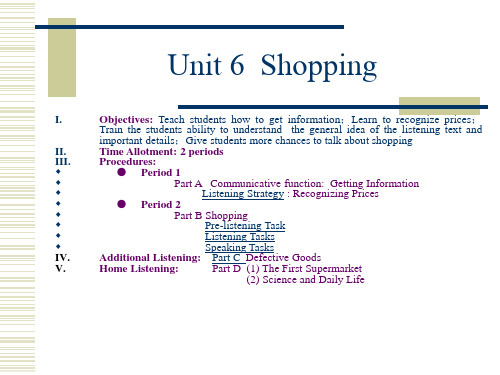
TeachiБайду номын сангаасg steps:
1. warm-up activity 2. Introduce useful expressions for getting infromation so that students can have an idea of the following exercise. 3.Play the tape once for the students to complete the exercise. 4.Make some explanation on difficult points. 5.Replay the tape for students to check the answer. 6.ask the students to say three or five sentences, using the expressions they have learned.
Unit 6 Shopping
I. II. III. IV. V. Objectives: Teach students how to get information;Learn to recognize prices; Train the students ability to understand the general idea of the listening text and important details;Give students more chances to talk about shopping Time Allotment: 2 periods Procedures: ● Period 1 Part A Communicative function: Getting Information Listening Strategy : Recognizing Prices ● Period 2 Part B Shopping Pre-listening Task Listening Tasks Speaking Tasks Additional Listening: Part C Defective Goods Home Listening: Part D (1) The First Supermarket (2) Science and Daily Life
大学英语听说教程1_Unit 2

大学英语听说教程1 Unit 2
WARM UP
Reference answers
GROUP 1 About your parents
请替换文字内容
4 What do your parents expect of you? 请替换文字内容 My parents expect me to be healthy, happy and independent.
请替换文字内容
3 What do your parents routinely do for you? Routinely, my parents take care of me in many ways, for example, preparing meals, doing the laundry, tidying up rooms, etc.
4 In what ways do you wish your parents were different from 请替文字内容 what they are like now? 请替换文字内容 5 How do you express your love for your parents?
5
大学英语听说教程1 ow do your parents express their love for you? 请替换文字内容 My parents express their love for me through what they do, but 请替文字内容 not through what they say.
WORD BANK
13
大学英语听说教程1 Unit 2
LISTEN TO UNDERSTAND
NEWS REPORT 1
大学英语听说教程1_Unit 1

grasp the main idea of news reports;
introduce yourself and inquire about others;
understand values of college education in Chinese and Western cultures.
B.They can have an interview with admission officers instead of taking 请替换文字内容 SAT and ACT.
C.They can apply for financial support from private sources. D.They can decide whether to gradu请a替te文字w内it容hin four years.
COLLEGE ENGLISH
LISTENING AND SPEAKING
大学英语听说教程
1BOOK
年度工作概 述• 添加相关标题文字 • 添加相关标题文字
• 添加相关标题文字 • 添加相关标题文字
01 U N I T
A new journey
大学英语听说教程1 Unit 1
CONTENTS
LEARNING OBJECTIVES WARM UP PRONUNCIATION LISTEN TO
2 What can most applicants to The请替G换e文o字r内g容e Washington University do
now?
A.They can choose whether to give the university their SAT and ACT
results.
